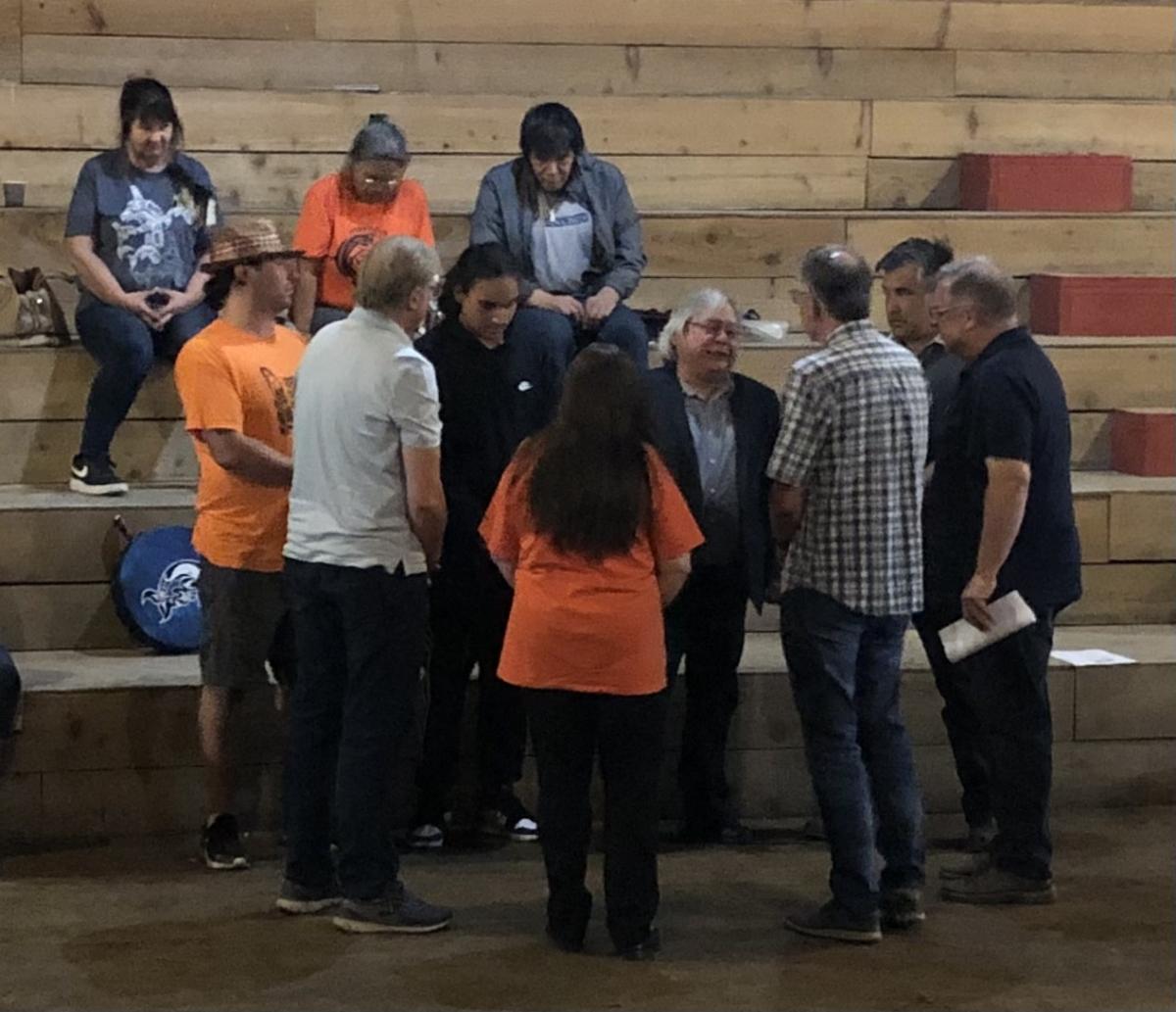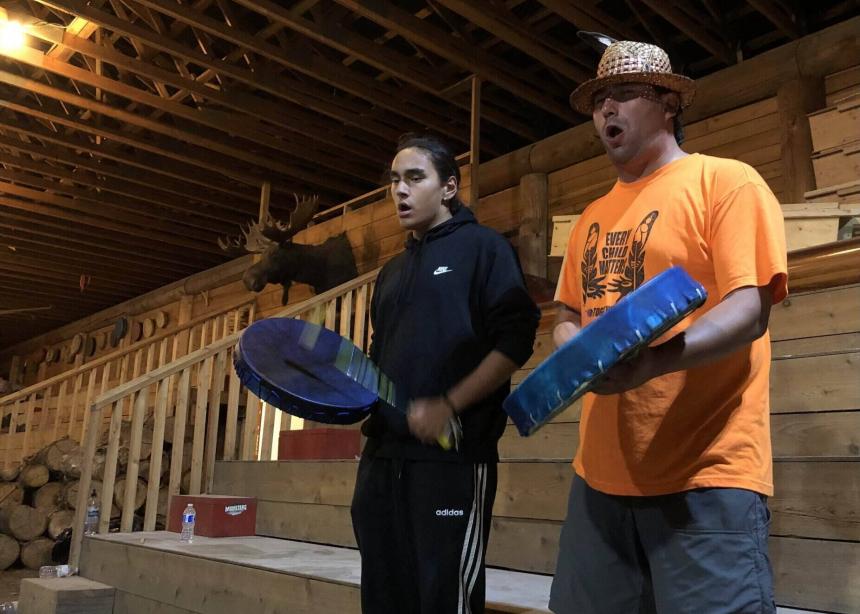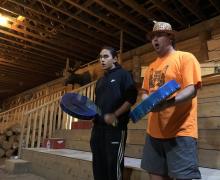Participants in the “Memories of Migration” tour went on the trip to commemorate history. On July 24 in Abbotsford, B.C., they got to witness it being made.
That’s when Richard Thiessen, president of the Mennonite Historical Society of British Columbia, apologized on behalf of the Society to representatives of the Semá:th First Nation (also known as the Sumas First Nation) for how they were displaced by their Mennonite ancestors.
In the apology, Thiessen, acknowledged the coming of the Mennonite immigrants and the draining of Sumas Lake had “a devastating impact on your people.”
The lake, which was a source of livelihood for the Semá:th First Nation, was drained between 1920 and 1924 to create fertile farmland for immigrants, including Mennonites.
“You were displaced from your dwellings, and your traditional fishing and hunting grounds were taken from you,” Thiessen said. “In so many ways, your lives were changed forever.”
While Mennonites, including many who came from the Soviet Union between 1923 and 1930, saw the newly drained land as a “positive opportunity,” it was “nothing like that for your people,” Thiessen said.
“The draining of the lake and our settlement on your ancestral lands was devastating and demoralizing and disrespectful.”

On behalf of the Society, and of those who “care about our Mennonite story,” Thiessen went on to “acknowledge the pain and loss that the Semá:th people have endured as a result of the draining of the lake and our settlement on your lands. I am sorry that this happened to you, and I am sorry for the role that our settler ancestors played in this devastating chapter of your lives.”
The apology was delivered at a meeting and meal in a traditional long house at the Semá:th First Nation, located east of Abbotsford on the edge of Sumas Mountain.
It was attended by members of the “Memories of Migration” tour, staff and board members of Mennonite Central Committee (MCC) B.C., local Mennonite church leaders and others, together with leaders from the Semá:th First Nation and other Indigenous people.
Reflecting on the arrival of those Mennonite immigrants 100 years ago, Thiessen said he wondered whether they were ever “curious about those who had cared for this land for thousands of years,” or saw them as neighbours.
“Perhaps some did, but I would venture to say that the answer is generally no,” he stated. “And for many of us here today, for much of our lives, we still haven’t seen you. We haven’t taken the time to sit down with you and listen to your stories, about your care for this land and your relationship to the Creator who placed you in this land.”
When Mennonites did see Indigenous people, he noted, it was to see them “as merely the targets of our missionaries who needed to bring you our Good News. We certainly didn’t believe that you had anything to offer to us.”
For that, Thiessen shared, he was sorry.
“I’m sorry that our mothers and fathers didn’t see you when they settled here 100 years ago,” he said. “I am sorry that we as a people did not take the time to get to know our neighbours, and to love them. I am sorry that those of us who preserve and tell our stories have not told our story within the broader context of the story of this land and your mothers and fathers who cared for it. I am sorry that when we have seen you, we have only seen you as people needing something from us. We have not seen the many gifts that you have to offer to us, the stories that we should have taken the time to hear.”
Our ancestors, he concluded, “have walked two different paths. By listening to each other’s stories and understanding each other’s pain and losses, we hope we can walk together on the path of reconciliation . . . We hope that this event can be a signal that we want to do things differently. We want to see you, hear you, understand you, respect you and build a better relationship with you.”
In response, Dalton Silver, chief of the Semá:th First Nation, accepted the apology and said it was “a step in the right direction” even if there is still “a ways to go.”
Noting that members of the tour had “come a long way to be with us,” he expressed thanks for how they took time to visit his community “and hear our stories.”
The group, he said, had been “on a long journey” from Quebec City to B.C. As the tour ended in that province, he hoped it would be the “start of a new journey of friendship and reconciliation together.”
In addition to Silver’s remarks, the event included comments from others including from MCC B.C., an Indigenous person and a retired local Mennonite Brethren pastor.
The event featured storytelling about the Semá:th First Nation, a meal and Indigenous singing and drumming. It concluded with tour members and others from the local Mennonite community singing the doxology, led by Henry Engbrecht.
After reporting on the first leg of the tour (from Quebec City to Kitchener-Waterloo, Ont.), Winnipeg freelance writer John Longhurst is blogging about the third and final leg (from Saskatoon, Sask. to Abbotsford, B.C.).
Read John's previous posts about the tour:
MoM 100: Young adults learn about their heritage on tour
MoM 100: Southeast Asian refugee migration remembered
MoM 100: B.C. concert explores ‘Music Along the Journey’
MoM 100: Grandfather and grandson bond on tour
MoM 100: Remembering a mother reluctant to talk about those times



Add new comment
Canadian Mennonite invites comments and encourages constructive discussion about our content. Actual full names (first and last) are required. Comments are moderated and may be edited. They will not appear online until approved and will be posted during business hours. Some comments may be reproduced in print.